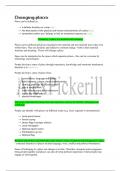Changing places
Place can be defined as:
® a definite location on a map (obj)
® the description of the physical and human characteristics of a place (obj)
® somewhere where you ‘belong’ or feel an emotional response to (subj)
Ultimately, a place is a location with meaning.
Places can be defined and given meaning by the material and non-material traces that exist
within them. They are dynamic and subject to constant change - both in their material
structure and meaning. Flows will change a place.
Space can be interpreted as the space which separates places - this can be overcome by
technology and transport.
People develop a sense of place through experience, knowledge and emotional attachment;
therefore it is subjective.
People develop a sense of place from:
1. conversation, language and dialect
2. belief systems, culture, rituals and ethnicities
3. clothing, products, food and services
4. jobs & employment
5. build infrastructure and architecture
6. day to day experiences
7. physical landscapes
Places are important for human life and experience such as for identity, belonging and
wellbeing.
People can identify with places on different scales (e.g. local, regional or international).
® Local sports teams
® Parish county
® Devon flags / bumper stickers
® Local newspaper
® National sports teams
® Stereotypes e.g. tea
® National flag
Religion and politics can both foster and contest a sense of identity and belonging to a place
- contested identities of places include language, wars, conflict and political boundaries.
Sense of belonging to a place can change over time. Churches, mosquies and synagogues
bring people together and places can also develop political importance which people may
engage or rebel against.
,We can also think of identity on a global scale (e.g. global citizen). This can be developed
through TNCS, historical links, entertainment and products. However global sense of place
can lead to:
® homogenisation of the high street (‘clone towns’ e.g., Totnes)
® loss of local sense of place and belonging (‘placelessness’)
Pseudo places - tourist places with no real sense of history or belonging.
Insider perspectives: the perspective of a person who knows a place well and has a lived
experience of that place. This is built through:
® strong relationship to the place since they are familiar with it / may have grown up
there
® direct relationship allows them to know the ‘reality’ of a place (e.g., unemployment,
homelessness, housing availability, transport)
® understand the norms and customs
® knows how to get around - feels safe & secure
® know how the place changes over time (temporal change)
Outsider perspectives: the perspective of someone who does not know a place well (e.g., a
visitor) or someone who is marginalised in a community such as the homeless, people from
minority groups and people with mobility issues.
® less familiar with the place as they might not have lived there or spent time there
® may live there but feel ‘out of place’ (socially excluded or alienated)
® may only know the place through media representations so may have stereotypical,
inaccurate or idyllic views of a place
the concept of insideness; the degree of attachment, involvement and concern that a person or
group has for a particular place. The more profoundly inside a place a person feels, the
stronger their identity with that place. This can be influenced by:
® physical barriers
® weather
® police
® lack of aid / resources
® stereotyping
® language and culture
® legal status
® social circle availability
® possessions
Factors affecting whether people feel belonging to a particular place:
Age: drinking age and accessibility for the elderly
, Gender: gender-neutral bathrooms, gender inequality laws (e.g., women couldn’t drive in
Saudi Arabia until recently), single gender schools
Sexuality: gay marriage laws, gay bars, adoption laws
Socio-economic status: expensive shops and restaurants, anti-homeless devices, private
healthcare
Religion: accessibility of places of worship, religious celebrations, clothing
Race and ethnicity: language barriers, multiculturalism in London
Positionality - the factors which influence how we perceive different places
Blackburn, Lancashire
® 2011 census - two largest ethnicity groups = 100,000 white British (66%) & 40,000
Asian mainly Muslim (24%)
® White disapproves of anniversary of birth of prophet Muhammad - feel like they are
excluded from religious parade (banners not in English - language barrier)
® Sense of need to retain English traditions
® Area north of centre is almost entirely Asian owned and south of town is mostly
white British (e.g. mill hill is a ‘white area’) - feel like they are segregated and have to
remain in their areas - lack of belonging to other side of town
® Some areas are in the top 10% most deprived - suggesting there is socio-economic
division
® 500 racially motivated crimes a year - 2/3 white on Asian
® Religion, race and language act as barriers through clothing, lifestyle choices etc.
® Has led to ‘White flight’
Categories of place
Near places and far places: can be geographically ‘near’ or ‘far’ (physical distance)
Experienced places: one in which a person has actually spent time (lived experience of a
place). The longer we spend in a place, the stronger our sense of place.
Perceptions and feelings of place change overtime - this is known as temporal shift.
Media places: a person has only read about or seen a place within various forms of media
such as
® Social media
® Forums
® Radio
® News





